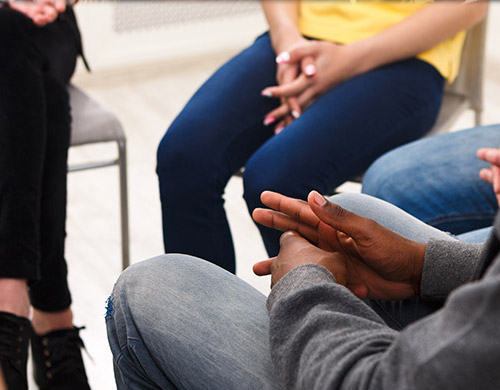Drug and alcohol dependence are hard to address when they hurt you or someone you love. Through proven rehabilitation therapies, drug addiction & alcoholism can be managed for long-term abstinence.
On this page we explore how an integrated treatment approach can enable you or a loved one to begin and sustain sober living.
What is Addiction Rehab (Rehabilitation)?
Addiction ‘rehabilitation’ is the process of medical care and psychotherapeutic interventions to tackle your dependency on substances such as recreational drugs, prescription drugs and alcohol. Addiction rehab offers the best chance of long term success if it is customized to the unique needs of the client and includes medically-assisted detoxification, residential or outpatient programs, and relapse management techniques such as aftercare.

Facts & Statistics about Addiction in Victorville
Prevalence of Substance Use Disorder, by Drug Type
(IN THOUSANDS)
- 2,7578.5%Any Substance
- 2,0886.4%Alcohol
- 1,0683.3%Ilicit Drugs
- 2060.6%Pain Medication
Drug- and Alcohol-Induced Deaths by Age Group, California, 2016
- Alcohol-Induced
- Drug-Induced
- 18 to 250.5
- 9.6
- 26 to 354.3
- 13.9
- 36 to 6424.2
- 22.9
- 65+23.7
- 9.4
Drug Use, by Selected Type and Age Group California, 2015 to 2016
- 12 to 17
- 18 to 25
- 26+
- Marijuana*13.2%
- 34.0%
- 13.5%
- Misuse of Pain Medications3.5%
- 8.0%
- 4.3%
- Cocaine0.8%
- 7.2%
- 1.8%
- Heroin0%
- 0.4%
- 0.2%
What are the treatment options available in Victorville
Understanding and healing the latent causes behind your substance or alcohol use disorder can be achieved through the use of an holistic treatment model. Exploring coping mechanisms to treat the root causes of your substance dependency is just as crucial as treating the symptoms of addiction.

Private Residential Programs
Stay within the property where you are receiving therapy, you are taking part in a residential addiction treatment program. Having Access to 24/7 support and addiction treatment is no doubt one of the biggest benefits.
There is substantial value in removing yourself from the home environment and becoming fully engaged in the addiction treatment program, because you are no longer sensitive to the stressors and triggers that may cause you to use substances. If you reside in a safe and supportive environment you can safeguard yourself from relapse and improve the chances of finishing your rehab program. Inpatient treatment programs are useful for those with serious alcohol or drug dependencies, co-occurring disorders or dual diagnosis.
Taking part in a residential treatment program is the most effective way to get sober, and sustaining it demands persistent focus because maintaining recovery is a challenge during the first few months. Finishing your residential rehab program is the beginning of your new, independent life and you will focus on goal-setting for your substance-free future.
Do You Need Help?
We work together towards recovery.

Sober Living Programs
You will receive support and guidance from a sober living program in order to control your future plans better. Sober living programs typically include:
- A house manager to check in with you daily
- Work on guidelines for your behavior in recovery
- Support and new friendships from those who are going through the same process as you.
Outpatient Programs
The flexibility of outpatient programs means that you do not have to stop attending your workplace or family commitments, as you can attend the rehab facility and undergo regular treatments at your own pace.
Outpatient programs teach you:
- Education about your drug abuse
- Counseling and talking therapies through group sessions and individual sessions with a skilled addiction therapist. – Outpatient programs should run from a few months to over a year, and your individual needs will determine the length of treatment.
Detox Only Programs
The early phase of a treatment program is a detox, which removes any substances from your system and begins healing your physical dependency on it. During the detox phase you will develop withdrawal symptoms as the system starts to function without the substance it was physically reliant on.
This detox phase marks the beginning of your rehabilitation process, the next phase is to tackle and heal the underlining reasons for your addiction, so that the pattern does not happen again. Many substances result in withdrawal and cravings for a period of time after they have been eliminated from your system. You can limit your chance of relapse by developing coping skills to apply to your new life.
Paying for Private Treatment
If you opt for private treatment, you can start the process by making a claim via your healthcare provider or pay the costs directly. Most insurance companies should contribute to some of the costs associated with drug and alcohol rehab, including a medically-supervised detox, rehab therapy and medication, as well as aftercare support.
Your provider along with policy terms and conditions will determine the amount of cover you can claim for. We always suggest that you confirm the amount covered for treatment prior to enrolling in rehab. To find out what you could claim through your insurance provider, go to our Verify Your Insurance page here.
If you decide not to claim against your insurance, you will need to pay for your treatment program with your own funds. Many rehab centers provide payment plans to clients who cannot afford the cost upfront.
State Funded Programs
State-funded treatment programs can be used by those who have alcoholism or substance addictions and who may not be in a situation to pay for private treatment. With the aid of funds from a combination of state, federal and Medicaid budgets, these types of treatment programs can remove hurdles to rehab by offering:
- A medical detox for those with severe dependencies
- Rehab treatment and ongoing care
These types of programs are there to assist people in low income households or those with no health insurance. In order to apply you need:

- Where you live
- Any income or earnings
- Evidence about your substance or alcohol addiction
- Living in the US legally
Further information about the application process can be found on here.
In order to locate contact details for your state agency, this document provides the needed information.
State-funded addiction support available in Victorville:
Saint John of God Healthcare Services Hospitality and Outpatient Center
15534 6th Street, Victorville, CA 92395
760-952-9192 x72506
nowebsite.comHigh Desert Child Adolescent and Family Services Center Inc
16248 Victor Street, Victorville, CA 92395
760-243-7151
highdesertcenter.orgCounty of San Bernardino Victorville CHOICE SUD Treatment
15480 Ramona Avenue, Victorville, CA 92392
760-243-8186
wp.sbcounty.gov/dbh/ads
Maintaining Addiction Recovery in Victorville
Maintaining addiction recovery can be difficult when you complete your treatment program. You had the benefits of professional support in a controlled environment at the rehab center. After leaving the rehab center you may encounter unanticipated challenges that you are not prepared for. Clients who had severe dependencies find long term recovery more difficult when they leave rehab if they do not have a social support structure. Without the relevant support and aftercare to guide you in your new life, relapse is a real possibility.
The following meetings are available in Victorville:
Marble Madness Group Stick Meeting
Open, Children Welcome and Wheelchair:
12625 Hesperia Rd Ste B, Victorville Ca. 92345
Tuesday: 7:00 PM
https://www.gma-na.org/CA - AND THUS WE GROW
Speaker, Participation, Open,
Chips Presented and Handicapped Access:
15624 6th Street, Victorville, CA 92395
Monday: 7:00 PM
http://www.inlandempireareaca.org/AA - Step Study Victorville
Open: 13230 El Evado Road, Victorville, CA, 92392
Saturday: 8:30 am – 9:30 am
https://alcoholicsanonymous.com/
Aftercare & Alumni Programs
An aftercare program continues to provide recovery support when you return to your home environment. By taking part in extended support, you can lessen the risk of relapse which hurts up to 60% of people who have recently completed a program. It is an essential service provided by most treatment centres. As you get near to completing your rehab program, we will support you to create an aftercare package that includes a range of services most helpful to your long-term recovery.
After completing your rehabilitation program you will become eligible to join an alumni community program so you can remain in contact with staff and peers. You will have access to Alumni events and receive support and encouragement from individuals who are in recovery long-term. We encourage you to consider supporting other former clients who are part of your network if that feels right.
Support groups (fellowship meetings)
Support groups continue to be an important function of long-term recovery because social structures inspire sobriety.

By joining a group that utilizes the 12 steps, like Alcoholics Anonymous and Narcotics Anonymous, you can receive life-long support via local meetings. When you go to support group meetings, you will the opportunity to share your challenges in recovery and listen to other members in similar walks of life. Companionship, empowerment and taking responsibility for our actions are key to long-term recovery, and meetings provide many with the necessary tools to stay sober.
Support for Families & Children Affected by Addiction
Addiction hurts everyone living in the household to different degrees. All members of the family need help with a household addiction, not just the addicted person. By joining family support groups, families can learn to manage stressful situations more effectively, and be able to provide better to your family member in recovery.
Receive help and support for the Family with the following support groups:
- Parents of Addicted Loved Ones
- SMART Recovery Family & Friends
- NAMI Family Support Groups
- Al-Anon
- Families Anonymous
- Alateen
- Nar-Anon










